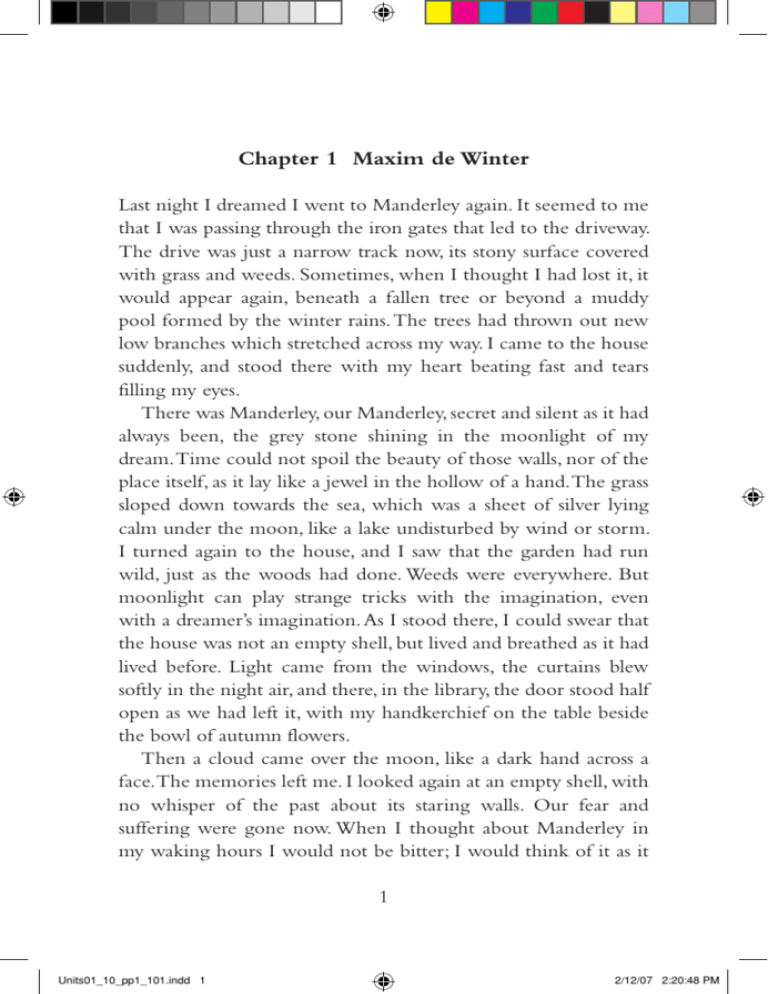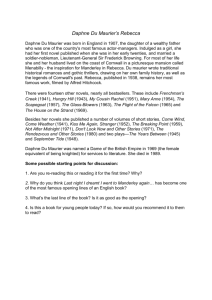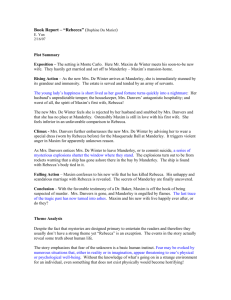Chapter 1 Maxim de Winter
advertisement

Chapter 1 Maxim de Winter Last night I dreamed I went to Manderley again. It seemed to me that I was passing through the iron gates that led to the driveway. The drive was just a narrow track now, its stony surface covered with grass and weeds. Sometimes, when I thought I had lost it, it would appear again, beneath a fallen tree or beyond a muddy pool formed by the winter rains. The trees had thrown out new low branches which stretched across my way. I came to the house suddenly, and stood there with my heart beating fast and tears filling my eyes. There was Manderley, our Manderley, secret and silent as it had always been, the grey stone shining in the moonlight of my dream. Time could not spoil the beauty of those walls, nor of the place itself, as it lay like a jewel in the hollow of a hand. The grass sloped down towards the sea, which was a sheet of silver lying calm under the moon, like a lake undisturbed by wind or storm. I turned again to the house, and I saw that the garden had run wild, just as the woods had done. Weeds were everywhere. But moonlight can play strange tricks with the imagination, even with a dreamer’s imagination. As I stood there, I could swear that the house was not an empty shell, but lived and breathed as it had lived before. Light came from the windows, the curtains blew softly in the night air, and there, in the library, the door stood half open as we had left it, with my handkerchief on the table beside the bowl of autumn flowers. Then a cloud came over the moon, like a dark hand across a face.The memories left me. I looked again at an empty shell, with no whisper of the past about its staring walls. Our fear and suffering were gone now. When I thought about Manderley in my waking hours I would not be bitter; I would think of it as it Units01_10_pp1_101.indd 1 2/12/07 2:20:48 PM might have been, if I could have lived there without fear. I would remember the rose garden in summer, and the birds that sang there; tea under the trees, and the sound of the sea coming up to us from the shore below. I would think of the flowers blown from the bushes, and the Happy Valley. These things could never lose their freshness. They were memories that could not hurt. All this I knew in my dream (because, like most sleepers, I knew that I dreamed). In reality, I lay far away, in a foreign land, and would wake before long in my lonely little hotel bedroom. I would lie for a moment, stretch myself and turn, confused by that burning sun, that hard, clean sky, so different from the soft moonlight of my dream. The day would lie before us both, long no doubt, but full of a certain peace, a calm we had not known before. We would not talk of Manderley; I would not tell my dream. For Manderley was ours no longer. Manderley was no more. We can never go back again; that is certain. The past is still too close to us. But we have no secrets from each other now; everything is shared. Our little hotel may be dull, and the food not very good; day after day, things may be very much the same. But dullness is better than fear. We live now very much by habit. And I have become very good at reading out loud. The only time I have known him show impatience is when the postman is delayed and we have to wait for our post from England. I have lost my old self-consciousness. I am very different from that person who drove to Manderley for the first time, hopeful and eager, filled with the desire to please. It was my lack of confidence, of course, that struck people like Mrs Danvers. What must I have seemed like, after Rebecca? I can see myself now, so long ago, with my short straight hair and young, unpowdered face, dressed in a badly fitting coat and skirt, following Mrs Van Hopper into the hotel for lunch. She would go to her usual table in the corner, near the window, and, looking to left and right, would say, ‘Not a single well-known Units01_10_pp1_101.indd 2 2/12/07 2:20:48 PM face! I shall tell the manager he must make a reduction in my bill. What does he think I come here for? To look at the waiters?’ We ate in silence, as Mrs Van Hopper liked to think about nothing but her food. Then I saw that the table next to ours, which had been empty for three days, was to be used once more. The head waiter was showing the new arrival to his place. Mrs Van Hopper put down her fork and stared. Then she leaned over the table to me, her small eyes bright with excitement, her voice a little too loud. ‘It’s Max de Winter,’ she said, ‘the man who owns Manderley. You’ve heard of it, of course. He looks ill, doesn’t he? They say he hasn’t been the same since his wife’s death. The papers were full of it, of course. They say he never talks about it, never mentions her name. She was drowned, you know, in the bay near Manderley . . .’ Her interest in other people was like a disease. I can see her as though it were yesterday, on that unforgettable afternoon, wondering how to make her attack. Suddenly, she turned to me. ‘Go upstairs quickly and find that letter from my brother’s son, the one with the photograph. Bring it down to me immediately.’ I saw then that she had made her plan. I wished I had the courage to warn the stranger. But when I returned, I saw that she had not waited; he was already sitting beside her. I gave her the letter, without a word. He rose to his feet immediately. ‘Mr de Winter is having coffee with us; go and ask the waiter for another cup,’ she said, just carelessly enough to warn him what I was. Her expression showed that I was young and unimportant, and that there was no need to include me in the conversation. So it was a surprise when he remained standing and made a sign to the waiter. ‘I’m afraid I must disagree,’ he said to her. ‘You are both having coffee with me,’ and before I knew what had happened he was sitting on my usual chair and I was beside Mrs Van Hopper. Units01_10_pp1_101.indd 3 2/12/07 2:20:48 PM For a moment she looked annoyed. Then she leaned forward, holding the letter. ‘You know, I recognized you as soon as you walked in,’ she said, ‘and I thought, “Why, there’s Mr de Winter, Billy’s friend; I simply must show him the photographs of Billy and his wife.” And here they are, bathing at Palm Beach. Billy is mad about her. He hadn’t met her, of course, when he gave that party where I saw you first. But I don’t expect you remember an old woman like me?’ ‘Yes, I remember you very well,’ he said. ‘I don’t think I should care for Palm Beach. That sort of thing has never amused me.’ Mrs Van Hopper gave her fat laugh. ‘If Billy had a home like Manderley, he wouldn’t want to play around in Palm Beach,’ she said. She paused, expecting him to smile, but he went on smoking, looking just a little disturbed. ‘I’ve seen pictures of it, of course,’ she said, ‘and it looks perfectly beautiful. I remember Billy telling me it was lovelier than any other house of its size and age. I am surprised you can ever bear to leave it.’ His silence was painful, as anyone else would have noticed, but she continued, ‘You Englishmen are all the same about your homes,’ her voice becoming louder, ‘you don’t want to seem proud of them. Isn’t there a great hall at Manderley, with some very valuable pictures?’ I think he realized my discomfort; he leaned forward in his chair and spoke to me, his voice gentle, asking if I would have some more coffee, and when I shook my head I felt that his eyes were still resting on me, wondering. ‘What brings you here?’ Mrs Van Hopper went on. ‘You’re not one of the regular visitors. What are your plans?’ ‘I haven’t made up my mind,’ he said, ‘I came away in rather a hurry.’ His own words must have raised a memory, for he looked disturbed again. She talked on, still not noticing. ‘Of course you Units01_10_pp1_101.indd 4 2/12/07 2:20:48 PM miss Manderley. The West Country must be lovely in the spring.’ ‘Yes,’ he said shortly. ‘Manderley was looking its best.’ In the end it was a waiter who gave him his opportunity, with a message for Mrs Van Hopper. He got up immediately, pushing back his chair. ‘Don’t let me keep you,’ he said. ‘It’s so nice to have met you like this, Mr de Winter; I hope I shall see something of you.You must come and have a drink some time. I have one or two people coming in tomorrow evening. Why not join us?’ I turned away so that I did not have to watch him search for an excuse. ‘I’m so sorry,’ he said, ‘tomorrow I am probably driving to Sospel; I’m not sure when I shall get back.’ Looking a little annoyed, she left it, and he went. ◆ The next morning Mrs Van Hopper woke with a sore throat and a rather high temperature. Her doctor told her to stay in bed. I left her quite happy, after the arrival of a nurse, and went down early for lunch – a good half-hour before our usual time. I expected the room to be empty, and it was – except for the table next to ours. I was not prepared for this. I thought he had gone to Sospel. I was halfway across the room before I saw him, and could not go back. This was a situation for which I was not trained. I wished I was older, different. I went to our table, looking straight ahead. But as soon as I sat down, I knocked over the bowl of flowers. The water ran over the cloth, and down onto my legs. The waiter was at the other end of the room and did not see. In a second, though, my neighbour was at my side. ‘You can’t sit with a wet tablecloth,’ he said, ‘you won’t enjoy your food. Get out of the way.’ He began to dry the table with his handkerchief, and then the waiter came hurrying to help. ‘Lay my table for two,’ he said. ‘This lady will have lunch with me.’ Units01_10_pp1_101.indd 5 2/12/07 2:20:49 PM ‘Oh, no,’ I said, ‘I couldn’t possibly.’ ‘Why not?’ I tried to think of an excuse. I knew he did not want to lunch with me. He was only being polite. ‘Come and sit down. We needn’t talk unless we want to.’ He sat down, and went on eating his lunch as though nothing had happened. I knew we could go on like this, all through the meal, without speaking but without any sense of awkwardness. ‘Your friend,’ he began at last, ‘she is very much older than you. Have you known her long?’ ‘She’s not really a friend,’ I told him, ‘she is an employer. She’s training me to be a companion, and she pays me.’ ‘I did not know one could buy companionship,’ he said; ‘it sounds a strange idea. You haven’t much in common with her. What do you do it for? Haven’t you any family?’ ‘No – they’re dead.’ ‘You know,’ he said, ‘we’ve got that in common, you and I. We are both alone in the world. Oh, I’ve got a sister, though we don’t see much of each other, and an ancient grandmother whom I visit two or three times a year, but neither of them provides much companionship. You know, I think you’ve made a big mistake in coming here, in joining forces with Mrs Van Hopper. You’re not made for that sort of job.You’re too young, for one thing, and too soft. Now go upstairs and put your hat on, and I’ll have the car brought round.’ I was happy that afternoon; I can remember it well. I can see the blue sky and sea. I can feel again the wind on my face, and hear my laugh, and his that answered it. It was not the Monte Carlo that I had known before. The harbour was a dancing thing, bright with boats, and the sailors were cheerful, smiling men, careless as the wind. I can remember as though I were still wearing it my comfortable, badly fitting suit, my broad hat, the shoes I wore. I had never looked more youthful; I had never felt so old. Units01_10_pp1_101.indd 6 2/12/07 2:20:49 PM ◆ I am glad it cannot happen twice, the fever of first love. For it is a fever, and a misery too, whatever the poets may say. One is so easily hurt. I have forgotten much of Monte Carlo, of those morning drives, of where we went, even of our conversation; but I have not forgotten how my fingers trembled, pulling on my hat, and how I would run down the stairs and go outside. He would be there, in the driver’s seat, reading a paper while he waited, and when he saw me he would smile, and throw it behind him into the back seat, and open the door, saying, ‘Well, how is the companion this morning, and where does she want to go?’ If he had driven round in circles it would not have mattered to me. Chapter 2 Manderley We came to Manderley in early May, arriving, so Maxim said, with the birds and the flowers before the start of summer. I can see myself now, badly dressed as usual, although I had been married for seven weeks. I wondered if he guessed that I feared my arrival at Manderley now as much as I had looked forward to it before. Gone was my excitement, my happy pride. I was like a child brought to her first school. Any confidence I had gained during my seven weeks of marriage was gone now. ‘You mustn’t mind if there’s a certain amount of interest in you,’ he said. ‘Everyone will want to know what you are like.They have probably talked of nothing else for weeks. You’ve only got to be yourself and they will all love you. And you won’t have to worry about the house; Mrs Danvers does everything. Just leave it all to her. She’ll be stiff with you at first, I expect. She’s an unusual character, but you mustn’t let her worry you.’ Units01_10_pp1_101.indd 7 10/4/08 09:37:33








